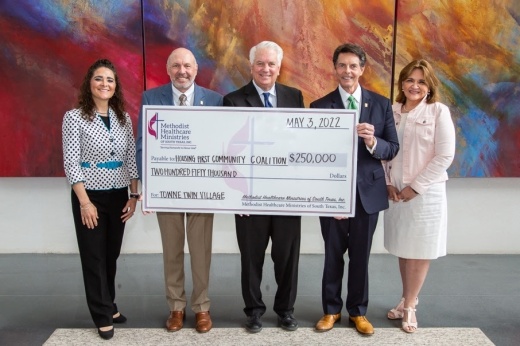San Antonio-based Methodist Healthcare Ministries of South Texas on May 3 announced it was providing $250,000 to the Housing First Community Coalition to help support the Towne Twin Village project on San Antonio’s East Side.
Once completed, Towne Twin Village will be San Antonio’s first single-site permanent supportive housing provider for individuals experiencing homelessness, a news release said.
MHMST President and CEO Jaime Wesolowski praised the Housing First Community Coalition for its efforts to address homelessness, according to the release.
“This funding embodies our commitment to health equity by supporting initiatives that help to reduce racial and socioeconomic disparities and create fair and just opportunities for every person to reach their full potential for health and life,” Wesolowski said.
In June 2019, HFCC targeted a 17.3-acre vacant parcel of land at 4711 Dietrich Road and, five months later, the coalition had raised $1.2 million to buy and rezone the East Side property, the release said.
HFCC has since worked to raise funds to cover Phase 1 development of the project, totaling more than $12.3 million from government and philanthropic sources.
Towne Twin Village will contain 205 units of affordable housing combined with intensive support services tailored to the specific needs and desires of each resident who has been experiencing homelessness, coalition officials said.
“The homelessness situation is a can we have been kicking down the road for far too long,” HFCC Board Chair Mark Wittig said. “With this gift from Methodist Healthcare Ministries, we are creating a model that can serve the homeless with dignity and make a statement that something good can be done.”
Wesolowski said housing is an important determinant of health, adding that research has shown housing stability, quality and affordability influence health outcomes as much as the physical and social characteristics of neighborhoods and communities.
“We know that health is more than what happens in a clinic. It’s determined by where people work, play, pray and age—all of which is heavily influenced by where people live,” Wesolowski said. “This project is a critical piece to ensuring we expand the ways we impact health care to include supporting the social determinants of health and the vital community conditions that so often determine long-term well-being.”





